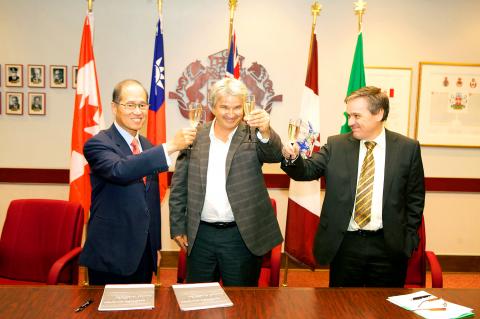An enthusiastic crowd packed the Tabaret Hall at the University of Ottawa on Wednesday evening for the official launch of the chair of Taiwan Studies at the Canadian capital’s top university.
The chair was made possible following an agreement between the university and Taiwan’s Ministry of Education.
The designated titular of the chair is professor Scott Simon from the department of sociology and anthropology, with professor Andre Laliberte of the school of political studies acting as co-chair.

Photo courtesy of Robert Lacombe, University of Ottawa
The chair will be interdisciplinary and extend to fields including political studies, anthropology, sociology, economics and development.
During the ceremony, which was co-organized by the Taipei Economic and Cultural Office, Simon said the university had already signed agreements with five Taiwanese universities.
“In the Faculty of Social Science, we already have two scholars who have been doing Taiwan Studies for well over a decade, with many publications. This is in addition to cutting-edge work in such fields as medicine and the hard sciences done in collaboration between [University of Ottawa] professors and Taiwanese scholars,” he said.
Laliberte said Taiwan’s unique situation could serve as inspiration for a wide number of issues.
“I am delighted to have the opportunity to teach our students about this democratic republic, from which we can learn a lot in the fields of science and public policy. Taiwan has a rich political culture and a tumultuous history that is sure to inspire debate in every sector of political science,” Laliberte said. “In the field of comparative politics, Taiwan has, since 1945, served as an experiment, with implications for all the great political questions of our time ... institutional reform, the separation of power and electoral development, all of which are part of the ‘Taiwanese experiment.’”

ANOTHER EMERGES: The CWA yesterday said this year’s fourth storm of the typhoon season had formed in the South China Sea, but was not expected to affect Taiwan Tropical Storm Gaemi has intensified slightly as it heads toward Taiwan, where it is expected to affect the country in the coming days, the Central Weather Administration (CWA) said yesterday. As of 8am yesterday, the 120km-radius storm was 800km southeast of Oluanpi (鵝鑾鼻), Taiwan’s southernmost tip, moving at 9kph northwest, the agency said. A sea warning for Gaemi could be issued tonight at the earliest, it said, adding that the storm is projected to be closest to Taiwan on Wednesday or Thursday. Gaemi’s potential effect on Taiwan remains unclear, as that would depend on its direction, radius and intensity, forecasters said. Former Weather Forecast

As COVID-19 cases in Japan have been increasing for 10 consecutive weeks, people should get vaccinated before visiting the nation, the Centers for Disease Control (CDC) said. The centers reported 773 hospitalizations and 124 deaths related to COVID-19 in Taiwan last week. CDC Epidemic Intelligence Center Director Guo Hung-wei (郭宏偉) on Tuesday said the number of weekly COVID-19 cases reported in Japan has been increasing since mid-May and surpassed 55,000 cases from July 8 to July 14. The average number of COVID-19 patients at Japan’s healthcare facilities that week was also 1.39 times that of the week before and KP.3 is the dominant

The Chinese Communist Party’s (CCP) working group for Taiwan-related policies is likely to be upgraded to a committee-level body, a report commissioned by the Mainland Affairs Council (MAC) said. As Chinese President Xi Jinping (習近平) is increasingly likely to upgrade the CCP’s Central Leading Group for Taiwan Affairs, Taiwanese authorities should prepare by researching Xi and the CCP, the report said. At the third plenary session of the 20th Central Committee of the CCP, which ended on Thursday last week, the party set a target of 2029 for the completion of some tasks, meaning that Xi is likely preparing to

US-CHINA TRADE DISPUTE: Despite Beijing’s offer of preferential treatment, the lure of China has dimmed as Taiwanese and international investors move out Japan and the US have become the favored destinations for Taiwanese graduates as China’s attraction has waned over the years, the Ministry of Labor said. According to the ministry’s latest income and employment advisory published this month, 3,215 Taiwanese university graduates from the class of 2020 went to Japan, surpassing for the first time the 2,881 graduates who went to China. A total of 2,300 graduates from the class of 2021 went to the US, compared with the 2,262 who went to China, the document showed. The trend continued for the class of 2023, of whom 1,460 went to Japan, 1,334 went to